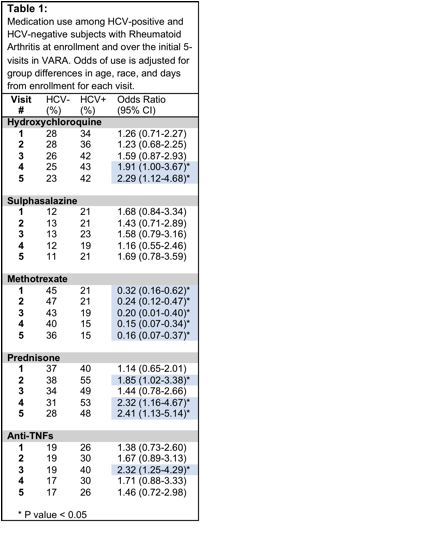Session Information
Session Type: Abstract Submissions (ACR)
The prevalence of concurrent rheumatoid arthritis (RA) and hepatitis C (HCV) is estimated at 0.02%, affecting around 40,000 Americans. To our knowledge, no existing studies evaluated disease characteristics and treatment patterns in RA patients with and without HCV infection. Our aim was to evaluate disease characteristics, component and composite measures of disease activity, and treatment patterns in HCV-positive subjects with RA compared to HCV-negative subjects with RA in a large national registry.
Methods:
We utilized the Veterans Affairs Rheumatoid Arthritis Registry (VARA) to identify subjects with RA and concomitant HCV. Subjects who were identified by the physician to have comorbid HCV infection at the time of enrollment were considered HCV-positive. The registry includes baseline and longitudinal measures that are updated and entered into the VARA database by the treating physicians at routine clinical visits. Differences in disease characteristics, disease activity measures, and treatment patterns were assessed over the first 5 clinical visits. Chi2 tests and T-tests or ranksum tests of significance were utilized for group comparisons. Linear and logistic regression analyses assessed group differences after adjustment for potential confounders (age, race and days from enrollment).
Results:
Of 1870 registry participants, 53 were identified with concomitant HCV (2.8%). At enrollment, HCV-positive subjects were younger [60.7 ±5.9 vs. 67.1 ±11.1 (p<0.0001)], more likely to be African American (62% vs. 38%, p=0.001) and to smoke (p=0.001). Other disease characteristics (anti-citrullinated protein antibodies, erosions and disease duration) were similar between groups. At enrollment, HCV-positive subjects had greater DAS28 [4.7 ±1.85 vs. 4.0 ±1.61 (p=0.05)], tender (p=0.001) and swollen joint counts (p=0.006). By visit 2, there were no observed group differences in disease activity. During the five-visit period, HCV-positive patients had more frequent follow up [12.1 ± 5.3 vs. 17.4 ± 11.8 (p=0.009)]. No differences were observed in patient global score, global evaluator score, Multidimensional Health Assessment Questionnaire (MD-HAQ), ESR, or CRP. At baseline, methotrexate use was less common among HCV-positive subjects (Table 1). By visit 2, subjects with HCV were more likely to use prednisone and, by visit 4, were more likely to use hydroxychloroquine. These differences in medications use persisted through the fifth visit (Table 1).
Conclusion:
At enrollment, HCV-positive subjects were younger, more likely to be African American, smoke, had higher joint counts, and were less likely to be prescribed methotrexate. Our data suggest more frequent follow up and use of prednisone and hydroxychloroquine over time among subjects with RA and concomitant HCV, may result in comparable early disease control compared to RA subjects without HCV.
Disclosure:
R. Patel,
None;
J. Baker,
None.
« Back to 2013 ACR/ARHP Annual Meeting
ACR Meeting Abstracts - https://acrabstracts.org/abstract/disease-characteristics-and-treatment-patterns-in-us-veterans-with-rheumatoid-arthritis-and-concomitant-hepatitis-c-infection/

